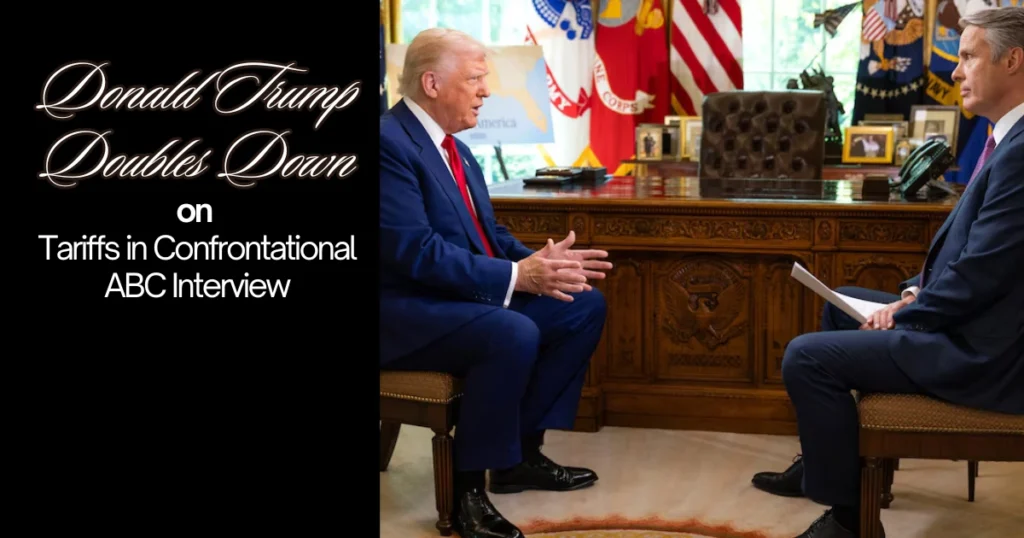President Donald Trump reached his first 100 days back in office with a fiery ABC News interview and a defiant rally in Michigan, where he stubbornly defended his aggressive tariff policies against China.
Even with the escalating concerns over rising consumer prices and economic instability, Trump remained committed, claiming that China would bear the brunt of the tariffs.
Read more about Donald Trump’s new regarding Trade Tariffs and China’s response, visit Route Shopping!
A Heated Exchange on Tariffs
In a tense interview with ABC’s Terry Moran, Trump dismissed fears that his 145% tariff costs on Chinese goods would lead to more increased prices for American consumers. “China probably will eat those tariffs,” he claimed, accusing China of long-standing trade abuses against the U.S. When Moran pointed out that such Trump tariffs could raise prices on everyday items, Trump retorted, “You don’t know that,” challenging the economic consensus.
Rallying Support Amid Economic Concerns
Trump appeared at a rally in Macomb County, Michigan, where he was addressing supporters about achievements of his administration and reinforcing his tough tone on trade. He vowed that the tariffs would restore U.S. manufacturing, specifically in Michigan’s auto industry.
Trump criticized the polls that showed dwindling acceptance and public fear about the economic impact of his policies, branding them “fake” and declaring that true support for his administration was far bigger.
Public Reaction and Economic Implications
While Trump’s base seemed galvanized by his action, many Americans grew worried about potential negative fallout on the economy. Economists have cautioned that the abrupt introduction of sweeping tariffs could injure small to medium-sized enterprises in the United States, which comprise a significant contribution to the GDP, and threaten to induce a recession within the country.
Critics argued that these businesses might not have sufficient time to adapt to the new trade policies, raising concerns over job losses and economic instability. Trump says voters unhappy about the economy and his China trade war should deal with it because ‘they did sign up for it, actually’.
Looking Ahead
The currently continuing Trump Administration’s “America First” trade agenda continues creating tensions within America regarding the trump trade policies and whether they are actually worth imposing or will create more consequences. Nonetheless, the supporters view the measures as necessary responses to unfair trade practices. However, with Trump dismisses tariff costs situation, others expect severe repercussions and the loss of important economic relationships.
For the close watchers of the economy, the coming months are going to be very important in determining how the trade war under Trump would play out for the domestic as well as international markets. So, stay updated with the today USA news.
Frequently Asked Questions (FAQs)
- How much does the US export to China?
In 2024, the US exported around $143.5 billion in goods to China. This represents a slight decrease from the $151.1 billion in exports to China in 2021, according to the Bureau of Industry and Security (.gov). China was the 3rd biggest export market for the US in 2023, behind Canada and Mexico.
- Who is China’s biggest export country?
China’s largest export destination is the United States, followed by Hong Kong, Japan, South Korea, and Germany. In 2023, the United States received $501.22 billion in exports from China, making it the largest single recipient.
Hong Kong, a major re-export hub, received $274.52 billion in exports from China during the same year. Japan, South Korea, and Germany received $157.50 billion, $148.98 billion, and $100.00 billion, respectively, according to Trading Economics.
- Does China have tariffs on US goods?
In April of 2025, China placed a 34% tariff, centralizing its imposition on all imports from the United States to match the earlier rate imposed by Trump in the same week. The move was made after the two rounds of U.S. tariffs between February and March, 10% each, mentioning China’s supposed contribution to the fentanyl crisis. Read more Donald Trump news related to: US-China Trade War Takes Off—But Boeing Jets Don’t

